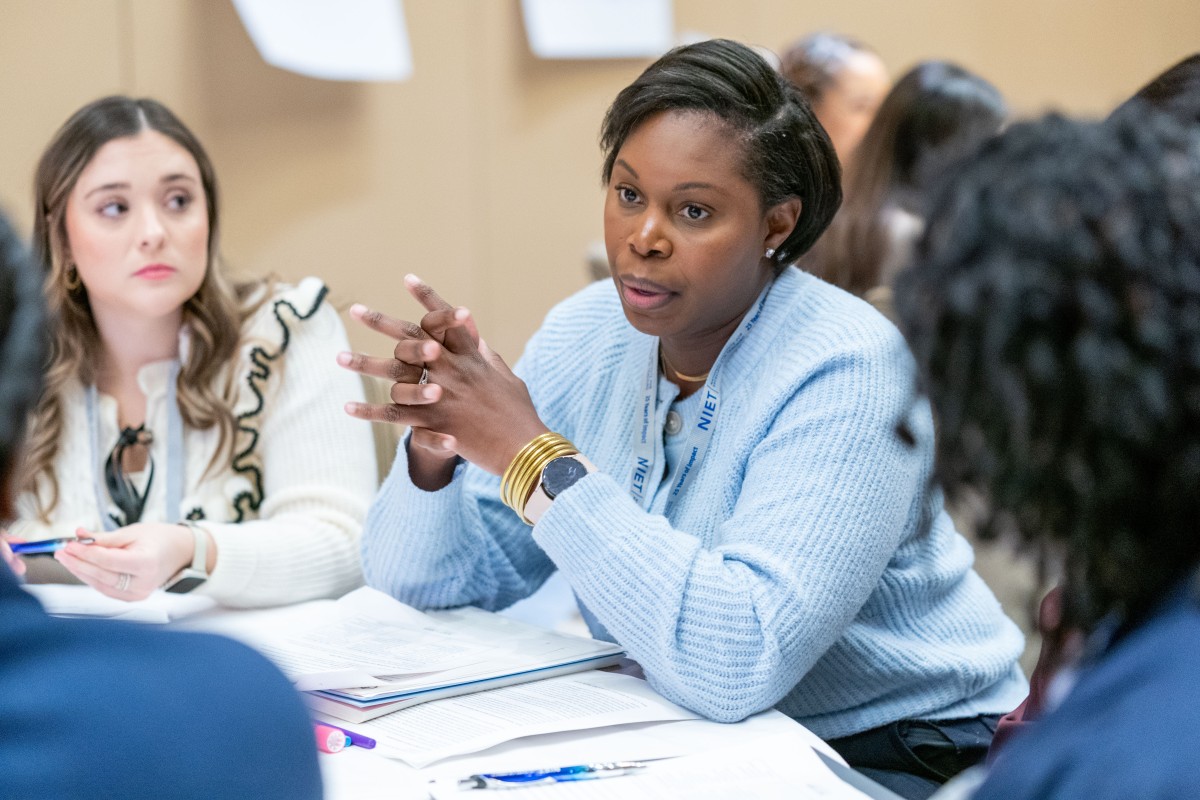What Aspiring Teachers Wish Every Leader Knew: A Teacher Panel Series
June 5, 2025

By NIET CEO Dr. Joshua Barnett
NIET forged its 25-year legacy through implementing proven strategies with partner schools, districts, states, and universities across the nation. Throughout this quarter century of experience, we have learned important lessons along the way, which is why we’re intentional about keeping our ears and doors open to those we support in classrooms every day. Our mission - to build educator excellence so all students have the opportunity for success - can only be achieved when teachers thrive.
Part of effectively supporting educators is listening to and learning from them directly: What are their needs and challenges? How do those evolve from the first year to the second, and beyond? Understanding real-time classroom dynamics by listening to educators’ insights is one of our most powerful tools. Along this approach, I am proud of our continued conversations with new teachers preparing for and entering the profession over the last two years.
The insights of these conversations were compelling. Across all three groups, we saw common threads of expectation, reality, and growth - with encouraging breakthroughs in our second-year cohort and clear signals for where education leaders must invest resources and energy to support and retain teachers from hiring through year two.
3 Lessons from Aspiring Educators:
1. Passion Drives Career Decisions: During our conversation with student teachers enrolled in university programs, a common theme became clear: Aspiring educators are grounded in purpose. Each student teacher shared personal stories rooted in their desire to make a difference, build positive learning opportunities, and establish support systems they valued - or wished they had - during their time as a student.
"I chose education, especially the middle level, because I know that that's when kids are really starting to learn about themselves and are finding their groups and are having a lot of struggles,” one aspiring teacher said. “I wanted to be there to show them that it's okay, and I can be there for them."
Centering teacher support and conversations around their “why” is the first step to developing a greater understanding of each educator and how systems of practice can sustain them. Their insights remind us that implementing effective support strategies fosters a stable foundation to build their teaching.
2. Real-world Exposure & Support Systems Are Invaluable: Aspiring teacher participants noted that their student teaching experiences and moments in the classroom are the most effective instructional experiences. NIET works with numerous educator preparation programs nationwide to elevate the student teacher experience, ensuring that they understand what effective teaching looks and sounds like before entering the classroom to teach themselves. Knowing this type of support is greatly appreciated by student teachers is a clear sign that placements within educator preparation programs is a component of directly addressing one of education’s greatest challenges from the start: teacher retention.
When aspiring teachers are prepared before entering the classroom, it reduces the uphill adjustment of entering any career field. In-classroom experience for aspiring educators builds their confidence and solidifies their expectations before they begin teaching, and provides them with needed supports as they enter the education profession. As a result, they step into their classrooms confidently - and stay.
One of the most intriguing parts of this conversation was the experiences these student teachers were already discussing and preparing for - from meeting varied student needs to focused instructional lessons and classroom management. Many spoke highly of their own peer support systems, or called for stronger collaboration if it was lacking, in their preparation programs. This reaffirmed that educator preparation is not just about knowledge and skills, but about community. NIET fosters this sense of community in our partner schools through clusters and creating structures and systems for providing support and coaching.
3. Balance and Support Will Lead to Greater Retention: Our new generation of teachers wants to remain in the field, and they are problem-solving how to sustain themselves before they even enter their profession. They are addressing key topics such as creating communities, seeking personal support, and identifying what lasting support looks like in the classroom.
As a supporter of teachers, this openness emphasizes an opportunity for education leaders: New teachers are telling us what they need to feel supported and confident in the field to stay, and it is our responsibility and opportunity to listen and respond. By intentionally responding to these needs, we not only set up our individual teachers for success but also build a more sustainable profession.
Stay tuned for the rest of this summer series, where we speak with aspiring, first-year, and second-year teachers to learn their needs and implement support based on their insights.